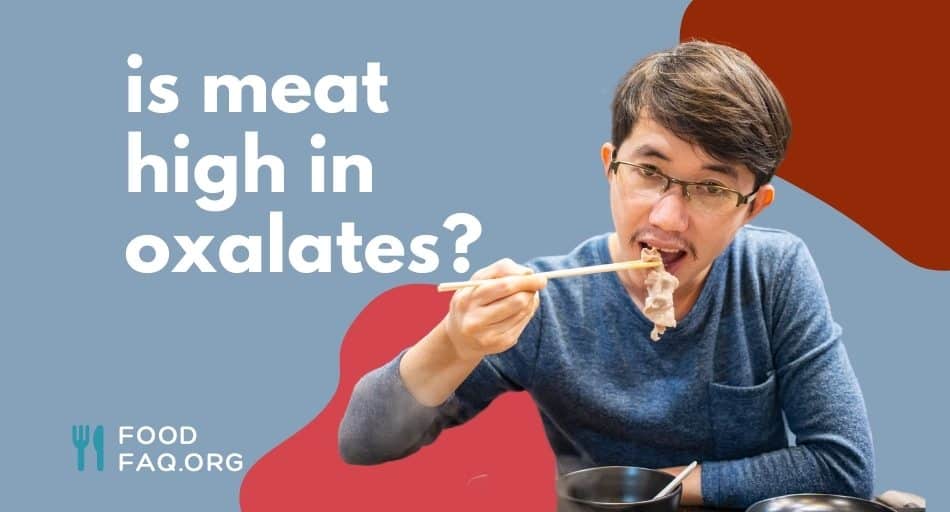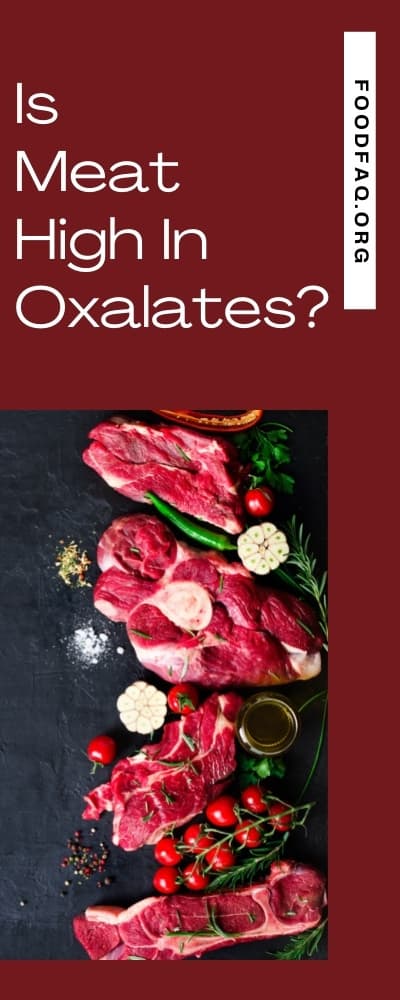Oxalates are naturally present in almost all foods. Generally, they're not harmful (especially in small amounts), but they can bind to calcium in some people, causing kidney stones. Furthermore, a diet particularly high in oxalates can prevent the absorption of many other nutrients.

Hence, it's important not to consume too many foods high in oxalates. To do that, it's a good idea to familiarize yourself with the oxalate content of common foods. For example, is meat high in oxalates?
Table of Contents
Is Meat High In Oxalates?
All types of meat contain barely any oxalates. Hence, they can be consumed by people struggling with kidney problems and those with kidney stones. Furthermore, all meats are rich in nutrients and minerals that maintain good health and high energy levels.
As a result, if you eat meat, it's a great idea to include all types in your diet.
What is the oxalate content of meat?
Beef, chicken, turkey, pork, and lamb contain less than 5 mg of oxalates per serving. This puts them in the low-oxalate category, thus suitable for people with kidney problems and others following a diet low in oxalates.
In general, all meats contain minimal amounts of oxalates, so they are not dangerous for good health. However, there might be higher oxalate levels in processed meat instead of the natural, fresh kinds.
On top of that, meat is one of a few food items that contain such low oxalate content among all food groups. This is great news since meat contains essential proteins — one of the three major macronutrients — that help fuel your muscles and maintain a strong metabolism. Furthermore, meat is also rich in many minerals and vitamins.
Is meat good for you?
Meat is very rich in vitamins and minerals as well as many nutrients. In fact, one serving (100 g) of turkey breast, for example, contains only around 104 calories and 17 grams of protein. This micronutrient helps you stay full after eating, and it also fuels your muscles.
What's more, consuming a diet high in protein also prevents weight gain as it protects your muscles from becoming an energy source instead of fat.

Moreover, a single serving of lean beef is also a great source of vitamin B12. Red meats are particularly high in this vitamin as opposed to lean, white meats. Vitamin B12 contributes to keeping your blood and nerve cells healthy, and it also plays a major role in preventing anemia.
Considering all of these health benefits, adding some red meat to your diet is a great idea.
Furthermore, consuming meat can lower your risk of bain fracture by strengthening your bones. This is because lean protein and high-protein foods contribute to good bone health. All meat types can also help prevent osteoporosis and other age-related bone conditions from developing.
Along with vitamin B12 and calcium that meat contains, meat can also improve the health of your teeth and the immune system.
Meat contains heme iron, which is absorbed better than plant-based iron. Iron contributes to proper growth and development. What's more, your body uses iron to help create hemoglobin that helps transport oxygen from the lungs to all parts of your body.
As a result, iron deficiency can be quite serious, so stocking up on this mineral is a wonderful idea, especially from such a good source as meat.
On the other hand, meat, especially the highly processed and well-done kind, can be carcinogenic. In fact, certain studies prove that it may lead to colon cancer, especially if consumed in large quantities and without adding antioxidant-rich foods.
However, this health risk can be prevented if you don't overcook your meat and consume highly processed foods. Otherwise, meat is a great addition to any healthy, balanced diet.
Is fried meat higher in oxalates than the broiled or roasted one?
Since most meats are very low in oxalates, not many studies have been done on the effects of different cooking methods on oxalate levels. However, studies performed on vegetables show that stir-frying, boiling, and roasting lower the oxalate content of the foods.
Hence, this might mean that cooking meat also lowers its oxalate content. Nevertheless, this doesn't change much since meat is already a low-oxalate food, so lowering its oxalate content even more, wouldn't change much.
Furthermore, frying meat in oil adds unnecessary calories through saturated fats, sometimes even trans fats. This has a negative effect on your health, so you should avoid it as much as possible. The best ways of preparing meat are by boiling it in sauces or roasting it in the oven. That way, you're not adding any oils, so you can get the healthiest meal possible.
Can you eat meat every day on a low-oxalate diet?
Meat is very low in oxalates, so that it can be a regular part of a low-oxalate diet. However, if you choose to consume meat daily or a couple of times a week, it's best to stick to lean, white meats as they are lower in calories but still high in nutrients and minerals.
Lean, white meat, such as chicken or turkey, also doesn't cause any negative health problems, such as increased cholesterol levels that red meats might induce.
On the other hand, there's not much difference in the oxalate content between red meats and chicken or turkey. So, if you're purely concerned with how high your oxalate content is, you can safely consume all types of meat.
The only thing to watch out for are processed meats, such as store-bought chicken nuggets or chicken wings. So, these should be avoided as much as possible.
All kinds of meat are low in oxalates. This means that they can be safely consumed by people with kidney stones and other kidney issues. Furthermore, all meat types provide you with various health benefits, nutrients, and minerals essential for staying healthy.
The high protein content also helps you stay full, preventing overeating and weight gain. Therefore, adding some healthy meats to your diet is a great idea.
